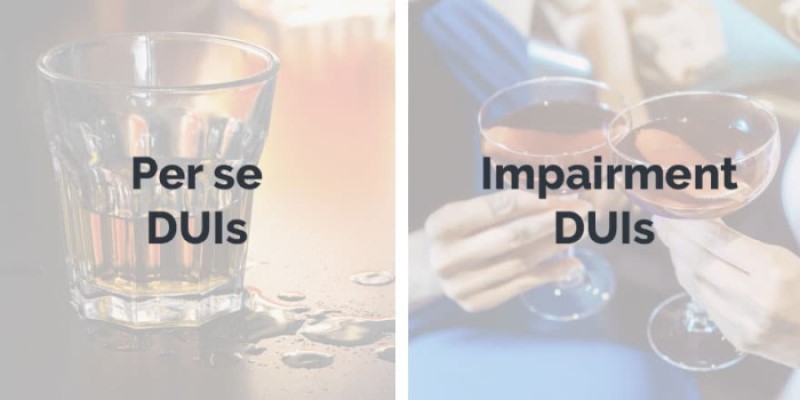
A “per se” DUI refers to driving under the influence of alcohol or drugs with a blood alcohol content (BAC) level above the legal limit, regardless of whether the driver’s abilities are actually impaired. An “impairment” DUI, on the other hand, refers to driving under the influence of alcohol or drugs where the driver’s abilities are actually impaired, even if their BAC level is below the legal limit. In other words, a per se DUI is based on the BAC level, while an impairment DUI is based on the driver’s behavior and physical signs of impairment.
Per Se DUIs
“Per se” DUIs (Driving Under the Influence) refers to cases where a person is charged with driving under the influence of alcohol or drugs with a blood alcohol content (BAC) level above the legal limit, regardless of whether their driving abilities are actually impaired. This type of DUI is based on the BAC level being above the limit set by law and does not require evidence of impaired driving to make the charge. The legal limit for BAC varies from country to country and state to state, but it is typically set at 0.08% in the United States.
What is considered per se?
“Per se” is a Latin term that means “in and of itself”. In legal terms, “per se” is used to describe an offense that is considered illegal based solely on the existence of specific circumstances, regardless of the defendant’s intent or other mitigating factors.
In the context of DUI (Driving Under the Influence) laws, a “per se” DUI refers to driving under the influence of alcohol or drugs with a blood alcohol content (BAC) level above the legal limit, regardless of whether the driver’s abilities are actually impaired. Other words, a “per se” DUI is based solely on the BAC level, and does not require evidence of impaired driving to make the charge. The legal limit for BAC varies by jurisdiction, but it is typically set at 0.08% in the United States.
Example OF Per Se DUIs
Here is an example of a “per se” DUI:
A driver is pulled over by the police for a routine traffic stop and the officer suspects the driver may be under the influence of alcohol. The officer conducts a breathalyzer test, which shows that the driver’s blood alcohol content (BAC) is 0.10%. In this scenario, the driver would be charged with a “per se” DUI because their BAC is above the legal limit of 0.08%, regardless of whether their driving abilities were actually impaired.
In this case, the prosecution would not have to prove that the driver was actually impaired, only that their BAC was above the legal limit. The driver would still face consequences for the DUI, such as fines, license suspension, and potentially jail time.
Implied Consent Laws
“Implied Consent Laws” refer to the legal principle that by operating a motor vehicle on public roads, a driver is deemed to have given their implicit consent to undergo chemical testing (such as a breathalyzer test) to determine their blood alcohol content (BAC) if suspected of driving under the influence of alcohol or drugs.
These laws vary by jurisdiction, but typically, if a driver refuses to take a chemical test when requested by a law enforcement officer, they can face consequences such as automatic license suspension, fines, and additional criminal charges. The purpose of these laws is to help enforce DUI laws and deter people from driving while under the influence.
It’s important to note that while implied consent laws are in place in many jurisdictions, drivers still have the right to refuse a chemical test and may choose to do so. However, the consequences of refusal can be significant, and it is advisable to seek legal counsel before making any decisions in a DUI case.
Impairment DUIs
An “Impairment DUI” (Driving Under the Influence) refers to a situation where a person is charged with driving under the influence of alcohol or drugs where their driving abilities are actually impaired, even if their blood alcohol content (BAC) is below the legal limit. This type of DUI is based on the driver’s behavior and physical signs of impairment, such as poor balance, slurred speech, and the odor of alcohol on their breath, rather than on their BAC level.
In an impairment DUI case, the prosecution must present evidence to show that the driver’s abilities were actually impaired, rather than relying on the BAC level alone. This type of DUI can be more difficult to prove than a per se DUI, as it requires evidence of the driver’s behavior and physical condition. However, it is still a serious crime, and a conviction can result in consequences such as fines, license suspension, and potentially jail time.
Conclusion
Understanding the differences between per se and impairment DUIs is important for anyone facing DUI charges. A “per se” DUI refers to driving under the influence of alcohol or drugs with a BAC level above the legal limit, while an “impairment” DUI refers to driving under the influence where the driver’s abilities are actually impaired, even if their BAC level is below the legal limit. “Implied Consent Laws” refer to the legal principle that by operating a motor vehicle on public roads, a driver is deemed to have given their implicit consent to undergo chemical testing to determine their BAC if suspected of driving under the influence. All types of DUIs are serious crimes, and a conviction can result in consequences such as fines, license suspension, and potentially jail time.








